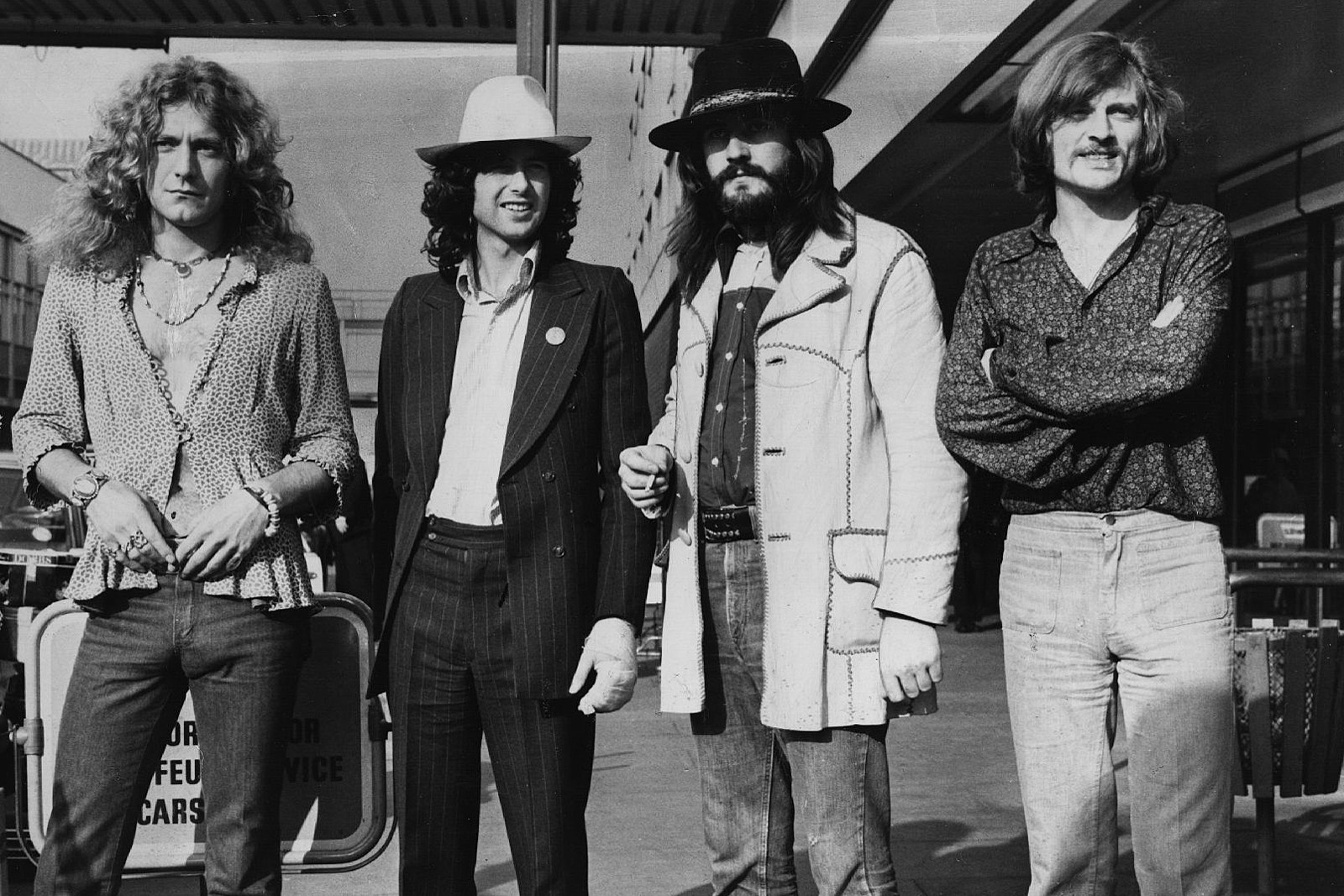No products in the cart.
News
When Did Led Zeppelin Break Up? Navigating the Turbulent Years and the Legacy Beyond
Led Zeppelin, a trailblazing rock band eternally embedded in the tapestry of music history, revolutionized the industry with their groundbreaking sound and iconic performances. This article delves into the chronicles of Led Zeppelin’s breakup, exploring the pivotal moments that culminated in the disbandment of this legendary rock phenomenon. One burning question that lingers in the minds of fans and music enthusiasts alike is, “When Did Led Zeppelin Break Up?”
Led Zeppelin’s Ascent and Musical Alchemy
Formed in 1968, Led Zeppelin rapidly soared to fame, blending rock, blues, and folk influences into a distinctive musical concoction. With Robert Plant’s vocals, Jimmy Page’s guitar wizardry, John Paul Jones on bass and keyboards, and John Bonham on drums, the band’s unique chemistry set them apart. Their success reached its zenith with albums like the eponymous fourth, featuring the timeless “Stairway to Heaven.” By the mid-1970s, Led Zeppelin stood tall as one of the world’s premier bands.

The Turbulence of the 1970s
The 1970s proved tumultuous for Led Zeppelin, marking a turning point in their illustrious career. Despite facing challenges, the band persevered, but the magic of their early years waned. Substance abuse issues took a toll, leading to strained relationships and erratic behavior. The tragic loss of Robert Plant’s son in 1977 cast a shadow over their music, ushering in a somber period. Despite continued performances and releases, Led Zeppelin struggled to recapture their earlier creative brilliance.
The Prelude to Dissolution
The tragic demise of John Bonham in 1980 inflicted a profound wound on the very soul of Led Zeppelin, becoming an irrevocable turning point that would reshape the course of the band’s history. Bonham, revered for his unparalleled drumming skills and integral role in the band’s sonic identity, was not merely a drummer; he was the rhythmic heartbeat of Led Zeppelin. His sudden passing sent shockwaves through the band, shattering not only their personal lives but also disrupting the delicate equilibrium of their musical synergy.

Bonham’s departure left a void so immense that it seemed impossible to fill. The surviving members, Robert Plant, Jimmy Page, and John Paul Jones, found themselves standing at a crossroads, faced with a daunting choice that would dictate the future of Led Zeppelin. The question loomed large: should they forge ahead without Bonham, attempting to navigate uncharted musical territory, or should they bring the curtain down on the illustrious journey they had embarked upon together?
The weight of this decision was palpable, and the band members grappled with the excruciating pain of bidding farewell to not just a bandmate but a brother in arms. Bonham’s absence was not only a loss of a skilled musician but also the loss of an irreplaceable dynamic that had fueled Led Zeppelin’s creative fire for over a decade. The studio sessions, the live performances, the camaraderie backstage – all bore the indelible mark of Bonham’s rhythmic prowess.
As they contemplated the future, each member felt the gravity of their individual contributions and the collective magic they had woven together. The prospect of forging ahead without Bonham seemed like an insurmountable challenge, an endeavor fraught with uncertainty and the risk of diluting the essence that made Led Zeppelin an unparalleled force in the realm of rock music.
In the wake of Bonham’s passing, the surviving members found themselves caught between the painful echoes of the past and the uncertain echoes of the future. The decision they would make in the coming days would not only determine the fate of Led Zeppelin but would also serve as a poignant testament to the enduring bonds forged through years of musical collaboration and shared experiences.
When Did Led Zeppelin Break Up?
The reverberations of John Bonham’s untimely departure culminated in a momentous announcement that sent shockwaves through the realm of rock music. On the fateful day of December 4, 1980, Led Zeppelin, the trailblazing musical entity that had captivated hearts and minds for over a decade, reluctantly issued a statement that would forever alter the course of their storied history.

In a somber declaration that echoed with a poignant finality, Led Zeppelin conveyed to the world that they were officially disbanding. The loss of John Bonham, the rhythmic maestro who had been an integral part of the band’s very fabric, was mourned not just as the departure of a band member but as the extinguishing of a musical flame that had burned brilliantly for years. The announcement resonated with the acknowledgment that Bonham’s absence left an irreplaceable void, one that transcended the conventional boundaries of band dynamics.
The disbandment marked the end of an era, a chapter in rock history concluding with a heavy heart. Fans, whose lives had been soundtracked by Led Zeppelin’s anthems, collectively mourned the dissolution of their beloved rock legends. Social media was not yet the ubiquitous platform it is today, but news of Led Zeppelin’s disbandment spread rapidly through radio waves, newspapers, and word of mouth, sparking a global outpouring of grief.
For enthusiasts worldwide, Led Zeppelin was not just a band; they were a cultural phenomenon, a source of inspiration, and a sonic companion through life’s highs and lows. The disbandment announcement left a palpable void in the hearts of millions, as the realization set in that the legendary quartet would no longer grace stages or studios together.
The impact of this farewell reached beyond the realm of music, transcending into the cultural consciousness. It was not merely the end of a band; it was the end of an era of musical exploration, innovation, and unparalleled creativity. Led Zeppelin’s disbandment symbolized the closing of a chapter in rock history, leaving behind a legacy that would forever be etched in the annals of music.
As Led Zeppelin bid their farewell, the resonance of their iconic compositions lingered, providing solace to grieving fans while simultaneously serving as a testament to the enduring power of their music. The disbandment was not just an endpoint; it was a poignant reminder of the fragility of artistic collaborations and the inevitable passage of time in the ever-evolving landscape of rock and roll.
Legacy and Aftermath
In the aftermath of Led Zeppelin’s disbandment, the echoes of their musical prowess resonated far beyond the silence that fell upon the iconic quartet. While the dissolution marked the conclusion of a remarkable chapter in rock history, the band’s legacy proved indomitable, leaving an indelible imprint on the tapestry of music that continued to inspire successive generations.

Musical Reverberations
Led Zeppelin’s influence endured, transcending temporal boundaries and resonating with new audiences. Their catalog of groundbreaking albums and timeless hits continued to be a source of inspiration for aspiring musicians and a touchstone for those navigating the ever-evolving landscape of rock music. The sheer magnitude of Led Zeppelin’s impact became a cornerstone of their legacy, solidifying their place among the pantheon of musical pioneers.
Individual Journeys
Following the disbandment, the members of Led Zeppelin embarked on individual musical journeys, each contributing to the rich tapestry of rock in their unique ways. Robert Plant, with his unmistakable vocals, ventured into solo projects that showcased his versatility and evolution as an artist. Jimmy Page, the virtuoso guitarist, explored diverse collaborations and solo endeavors, leaving an indelible mark on the world of rock and blues. John Paul Jones, the multi-instrumentalist, demonstrated his musical dexterity through solo ventures and collaborations that underscored his role as a creative force.
Honoring Collective Roots
While pursuing solo projects, the members of Led Zeppelin remained connected to their collective roots. In their individual endeavors, there was a palpable nod to the shared history that defined their time together. Whether through subtle musical references, occasional collaborations, or reflective interviews, Plant, Page, and Jones paid homage to the magic they had created as Led Zeppelin.

Continued Cultural Relevance
Led Zeppelin’s music retained its cultural relevance, finding its way into soundtracks, commercials, and the collective consciousness of a global audience. The timeless quality of their compositions ensured that new generations discovered and embraced the magic woven into every note and lyric. The enduring popularity of Led Zeppelin served as a testament to the timelessness of their artistry and its ability to transcend generational boundaries.
In conclusion, Led Zeppelin’s breakup in 1980 marked the end of a significant chapter in rock music. While the band faced challenges and turbulence over the years, the loss of John Bonham proved insurmountable. Led Zeppelin’s legacy persists through their iconic music, a testament to the intricacies of fame, creative collaboration, and the enduring impact of rock and roll.
